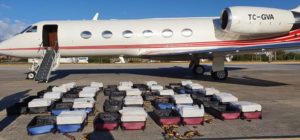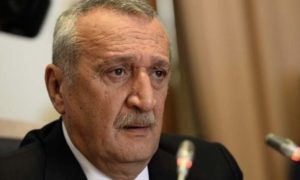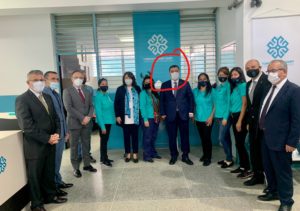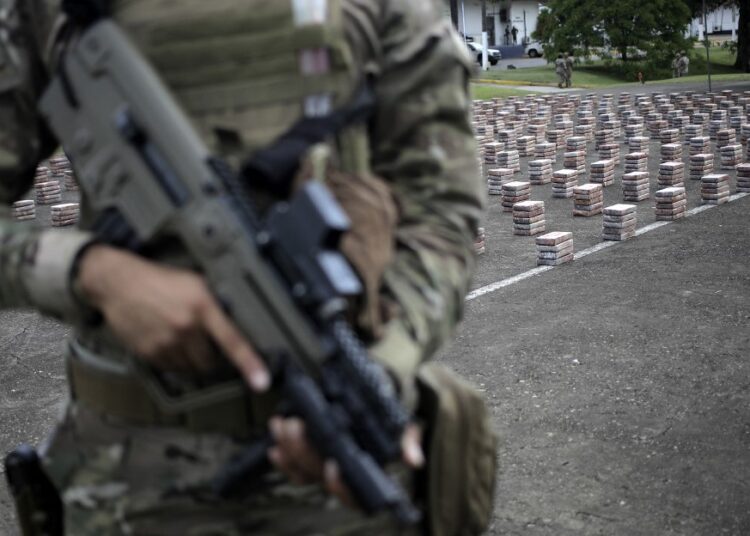Abdullah Bozkurt/Stockholm
In a damning report, the United Nations concluded that Turkey has increasingly become a hub for cocaine trafficking for Europe and the Middle East under the rule of President Recep Tayyip Erdogan, whose government was accused by the Turkish opposition of providing protection for mafia groups and organized crime syndicates that traffic drugs through Turkey.
“Türkiye has been increasingly used as a transit country for cocaine in recent years. Since 2014, the amount of the drug seized in the country has increased sevenfold from 393 kg to a record 2.8 tons in 2021. Some of the cocaine reaching Türkiye arrives after transiting through West Africa, and some comes directly from Latin America,” said the report issued by the United Nations Office on Drugs and Crime (UNODC) on April 6, 2023.
“The use of South-Eastern Europe for cocaine trafficking is likely to continue to increase as the region is another entry point for cocaine destined primarily for European markets,” the report highlighted, pointing to Turkey as the crossing point by air and sea for such trafficking. “The points of departure for cocaine trafficked to Türkiye remain in South America.”
The report said some of the cocaine reaching Turkey arrives after transiting West Africa and some comes directly from Latin America, with the outbound cocaine flowing westward from Turkey through the Black Sea and the Balkans, a route traditionally associated with the trafficking of opiates and the smuggling of cigarettes.
According to the UN, the growing supply of cocaine transiting Turkey adds another stream through the Balkans, and it was predicted the Balkan route is likely to continue growing in importance, with Balkan criminal actors more active in the European cocaine market than ever.
Parts of the UN report on cocaine trafficking through Turkey:
In the last decade, the Erdogan government has been the target of serious allegations amid seizures of drugs in Spain, Colombia and other places that were destined for Turkey. Drug traffickers and mafia groups were allowed by the Erdogan government to operate in Turkish territory and were provided with political cover so they could act with impunity.
The latest such incident took place on May 16, 2023 when Dutch authorities uncovered at the Port of Rotterdam 1.1 tons of cocaine with an estimated street value of 84.3 million euros hidden among car tires in a container originating from Turkey. On March 24, 2023 Peruvian authorities discovered 2.3 tons of cocaine with a value of $20 million disguised as ceramic tiles bound for Turkey in a warehouse at the port of El Callao near Lima.
On April 13, 2022 five people including four Turkish citizens were arrested by Spanish police when a fishing boat carrying 2.9 tons of cocaine, estimated to have a street value of 72 million euros, was intercepted off the Canary Islands. On April 8, 2022 customs officials in Malta seized 800 kilograms of cocaine, estimated to have a value of 108.2 million euros, on a ship that was en route to the southern Turkish province of Mersin from Colombia.
Turkey’s emerging role as an important player in cocaine trafficking was first put in the spotlight in June 2020, when Colombia’s narcotics police seized almost five tons of cocaine. The drug was in two containers that were to travel by sea from the port of Buenaventura to Turkey and had a street value of $265 million.
That was followed by another bust when Brazilian police discovered 1.3 tons of cocaine on a Gulfstream IV jet owned by a Turkish businessman that previously belonged the Turkish government fleet. The plane was supposed to fly to Lisbon and then Brussels before returning to Turkey.

None of these drug busts abroad were effectively investigated and prosecuted in Turkey in order to uncover the Turkish connection and punish the violators. Most legal cases, opened after mounting pressure from the international community on the Erdogan government, resulted in the release of the drug traffickers.
The trafficking network in Turkey is believed to be controlled by Mehmet Kemal Ağar, a notorious nationalist politician and former minister. Ağar is a key figure who mentors Interior Minister Süleyman Soylu in illegitimate schemes. Both men were named as being involved in cocaine and other drug trafficking networks in and through Turkey by Sedat Peker, a convicted mob boss and former ally of the Turkish president.
Peker turned against his former allies and started revealing the dirty laundry he and Erdogan’s people were involved with. According to him, cocaine from Latin America is also entering the Middle East market through Turkey thanks to Erkan Yıldırım, the son of AKP heavyweight and former prime minister Binali Yıldırım. The son visited Venezuela twice and established a new route for shipping the drugs. Both the father and son own maritime companies, some established under various names in offshore, tax-haven islands.

The cocaine brought to Turkey in bulk was divided into smaller batches and transported to the Middle East on luxury yachts through ports that Ağar and his people control in Turkey. They faced no crackdown from law enforcement agencies thanks to a massive purge of these agencies starting in 2014 by the Erdogan government. Ağar helped facilitate this purge to clear the path for Erdogan’s clandestine business activities that were hampered at times when the police or gendarmerie intercepted, investigated and exposed secret and illegal operations.
Ağar brought nationalists and controversial figures, some convicted for their ties to the mafia, into the management of the Security General Directorate (Emniyet), the national police department. In exchange for providing political and legal protection for drug trafficking, Ağar, Soylu and at the top Erdogan have been receiving cuts from drug money and enriching themselves and their cronies from the sale and trafficking of cocaine and other drugs.
Some of the drug money is being laundered in the breakaway Turkish Republic of Northern Cyprus (KKTC), a self-proclaimed state on the Turkish side of Cyprus that is under the control of Turkey. Until his death in a February 2022 attack, Halil Falyalı, who owned several casinos and hotels in the KKTC, was a key figure in this money laundering. His business ventures were taken over by other operatives under the control of the Erdogan government.

Turkey’s Deputy Foreign Minister Yasin Ekrem Serim and his brother Halil İbrahim Serim together held 10 percent of the shares in a company called Northern Associates Trading Limited, established on December 22, 2020. Falyalı owned the remaining 90 percent. The Serim brothers’ father, Maksut Serim, is a former aide to President Erdogan and is currently a manager at state lender Halkbank. Maksut also served as an aide to Erdogan for an uninterrupted 12 years when the Turkish leader held the office of prime minister. Their relationship dates back to when Erdogan was mayor of İstanbul in the ’90s.
In May 2011 a US district court in Virginia charged Falyalı with money laundering and drug trafficking. The trial was concluded in absentia in 2016, and Falyalı was found guilty. He has been wanted by US authorities ever since, the reason Falyalı never left the KKTC. Enjoying considerable influence over the small island with his multibillion-dollar fortune, Falyalı managed to avoid any handover to the US thanks to protection provided by the Erdogan government.
Cocaine drug money is still being laundered in the KKTC by Ağar, who uses casinos, gambling venues and online betting sites in the breakaway part of Cyprus before being injected into Turkey’s economy. The sophisticated scheme includes non-Turkish mafia groups and drug traffickers as well.
The UN report highlighted Turkey’s growing role in global cocaine trafficking:
It is no coincidence that Europe’s most-wanted drug traffickers are increasingly evading capture by becoming Turkish citizens as VICE World News reported last month, citing European law enforcement officials.
The officials, speaking to VICE, have grown concerned that criminals linked to large-scale drug trafficking are exploiting Turkey’s policy of issuing citizenship to investors while also taking advantage of the fact that the country refuses to extradite its new citizens. In 2018 Turkey eased its rules for foreigners to acquire citizenship through investment and the purchase of real estate.
An article in Homeland Security Today on April 12, 2023 also showed that the Turkish criminal networks involved in the cocaine trade between the Middle East and Latin America had recently merged with fentanyl trafficking as well.
The article suggested that politicians, bureaucrats and criminal groups in Turkey are involved in the cocaine trade that has flourished under the Erdogan government. The article further noted that the purge of more than 95 percent of anti-drug trafficking teams since December 2013 created a favorable environment for criminal markets in Turkey.
Full text of the UN report:












